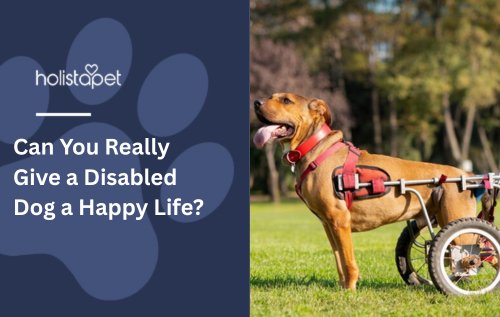Caring for a disabled dog may seem overwhelming at first, but it’s one of the most rewarding experiences any pet parent can have. Whether your dog has mobility issues, vision or hearing loss, or other physical limitations, they can still live a joyful, fulfilling life—with your help.
In this post, we'll explore practical tips for disabled dog care, common concerns, and expert-backed advice to ensure your loyal companion thrives.
 Understanding Disabled Dog Needs
Understanding Disabled Dog Needs
Every disabled dog is unique. Some are born with disabilities, while others experience injuries or age-related conditions. The most common challenges include:
-
Limited mobility (e.g., due to paralysis or amputation)
-
Blindness or deafness
-
Chronic pain or neurological disorders
-
Incontinence or digestive problems
Your job as a dog parent is to adapt and create an environment where your pup feels safe, loved, and comfortable.
Daily Care Tips for Disabled Dogs
1. Mobility Assistance
Invest in dog wheelchairs, slings, ramps, or orthopedic beds. These tools help reduce strain and allow your dog to move more freely around the house.
2. Routine & Safety
Stick to a schedule for feeding, bathroom breaks, and medication. Use baby gates or soft padding to prevent injuries, especially for dogs with vision loss.
3. Hygiene & Skin Health
Clean up accidents quickly and keep their skin dry to avoid infections. Gentle grooming helps detect early signs of pressure sores or irritation.
4. Mental Stimulation
Disabled doesn’t mean inactive! Puzzle toys, scent games, and short outdoor strolls (if possible) help boost their mental health.
5. Vet Checkups
Work with a veterinarian familiar with special needs pets. Regular checkups are vital for adjusting care plans as needed.
 Frequently Asked Questions
Frequently Asked Questions
Q: Is it cruel to keep a disabled dog alive?
Absolutely not. Many disabled dogs live happy, meaningful lives with the right care. Disabilities don’t take away their desire to love or be loved.
Q: Can a paralyzed dog still go outside?
Yes! With the help of a wheelchair or a sling, many dogs enjoy walks, sniffing around, and even light playtime outdoors.
Q: Are there organizations that support disabled dogs?
Yes. Groups like HandicappedPets, Eddie's Wheels, and local animal shelters offer tools, support, and sometimes financial help for pet owners.
Q: Will my dog still enjoy life with limited abilities?
Yes—dogs are incredibly adaptable. With patience, encouragement, and a little creativity, your dog can find joy in daily moments just like any other pet.
Final Thoughts
Disabled dog care is a journey of compassion, adaptability, and deep emotional connection. What may start as a challenge often turns into one of the greatest bonds you'll ever share with a pet. From building trust to overcoming obstacles together, your efforts can truly transform your dog’s life.
🐾 Helpful Notes:
-
Start slow—small changes can make a big impact.
-
Join online communities for support and advice.
-
Focus on quality of life, not just physical ability.
-
Celebrate every win—no matter how small.
Want more helpful guides like this? Bookmark our site for pet care resources, product tips, and real stories from dog lovers like you.


 CBD Oil for Dogs - Fast Acting
CBD Oil for Dogs - Fast Acting
 Chicken Flavored CBD Oil For Dogs - Easy Dose
Chicken Flavored CBD Oil For Dogs - Easy Dose
 Salmon Flavored CBD Oil For Dogs - Highly Rated
Salmon Flavored CBD Oil For Dogs - Highly Rated
 CBG Oil for Dogs and Cats - Loved by Thousands
CBG Oil for Dogs and Cats - Loved by Thousands





Leave a comment
This site is protected by hCaptcha and the hCaptcha Privacy Policy and Terms of Service apply.